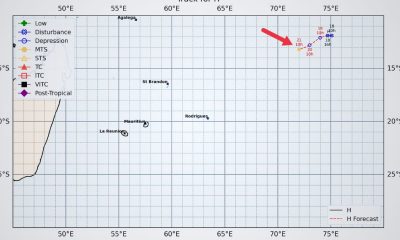Tech
Mauritius Digital Connectivity: 88.6% of Homes Now Have Smartphones

Mauritius is experiencing a significant boost in digital technology adoption, according to the latest figures released by Statistics Mauritius in July 2025. Over the past four years, more households and individuals are embracing smartphones, internet, and digital services, marking a clear shift toward a more connected society.
Growth in Household Technology
Between 2020 and 2024, the percentage of households with smartphones increased from 81.4% to 88.6%.
Internet access within homes also saw notable growth, rising from 72.6% to 85.8%.
The adoption of smart TVs more than doubled, with 70.2% of households owning one in 2024, compared to 37.7% in 2020.
Meanwhile, subscriptions to paid TV channels also grew, reaching 46.2%, up from 31.5%.
Increasing Usage Among Individuals
At the personal level, mobile phone usage continues to expand. By 2024, around 93% of people aged five and older were using a mobile phone, up slightly from 91% in 2020.
Computer use grew marginally from 46.8% to 47.5%, primarily among young people aged 12 to 29.
Mobile Communications in Focus
Mobile phones dominate local communication. About 90% of all local calls in 2024 were made from mobiles.
However, these calls tend to be shorter—averaging 1.2 minutes—compared to 2.3 minutes on landlines.
From 2023 to 2024, the total number of local mobile calls decreased by 5.3%, falling from 1.123 billion to 1.063 billion calls.
Despite this decline in volume, total call minutes increased by 8.9%, reaching 1.263 billion minutes, indicating longer average call durations.
International calling patterns show contrasting trends. Outgoing international calls dropped sharply by 23.5%, totaling 17.9 million minutes, while incoming international calls increased by nearly 10%, reaching 18.9 million minutes.
Meanwhile, SMS messaging experienced a surge, with 19.8% more messages sent—totaling nearly 302 million in 2024.
Internet Usage and Infrastructure Expansion
Internet adoption is accelerating rapidly. In 2024, 83.2% of people aged 12 and above connected online, compared to 68.3% in 2020.
The most significant growth is among young people: 97.5% of those aged 12-19 and 98.6% of those aged 20-29 connect regularly.
Infra-structure improvements reflect this digital shift. Mauritius’s international bandwidth capacity increased by 21.2% in one year, reaching 354.517 Mbps, up from 292.549 Mbps in 2023.
Per person, the average connectivity now stands at 284,872 bits per second, up from 234,543 in 2023.
Data exchange volumes have also surged. Downloads rose by 35.6%, exceeding 1.1 million terabytes, while uploads increased by nearly 35%, reaching about 105 terabytes.
The number of internet subscriptions grew 7.4%, from 2.06 million in 2023 to over 2.21 million in 2024.
Mobile internet connections increased by 8.1%, and fixed-line subscriptions by 3.9%. The overall subscription rate now stands at 178.1 per 100 residents, compared to 165.4 last year.
Broadband and Mobile Internet
Most internet subscriptions are now high-speed, with broadband connections increasing by 7.6% to over 2.2 million.
Meanwhile, low-speed connections, primarily mobile since 2022, decreased by 16.7%, totaling just 8,500.
Mobile broadband dominates, accounting for nearly 84% of all internet subscriptions, with 1.85 million users—an increase of 8.3%.
Telecommunication Services and Costs
The number of fixed-line telephone subscriptions grew slightly, reaching 468,800 lines in 2024, or 37.7 lines per 100 residents.
Mobile coverage remains nearly universal at 99%. The total mobile subscription count rose by 4.3%, surpassing 2.19 million.
Prepaid plans remain prevalent, representing 83% of mobile subscriptions and increasing by 3.1%, while postpaid plans surged by 10.8%.
The mobile subscription density now stands at 176.4 per 100 residents.
Tariff rates for both fixed and mobile calls remained stable between 2023 and 2024.
However, the cost of internet services as a percentage of gross national income (GNI) per capita declined slightly.
The monthly fee for a fiber optic plan offering 10 Mbps and 60 GB of data fell from 1.0% to 0.9%.
Similarly, a mobile plan with 75 GB of data, 140 minutes of calls, and 70 SMS now costs 0.7% of GNI per capita, down from 1.1%.
Mauritius is making notable progress in digital connectivity, with rising smartphone penetration, expanding internet access, and improved infrastructure.
These developments are fostering a more connected society, especially among young people, and positioning the country for further digital growth in the coming years.
Source: l’Express











